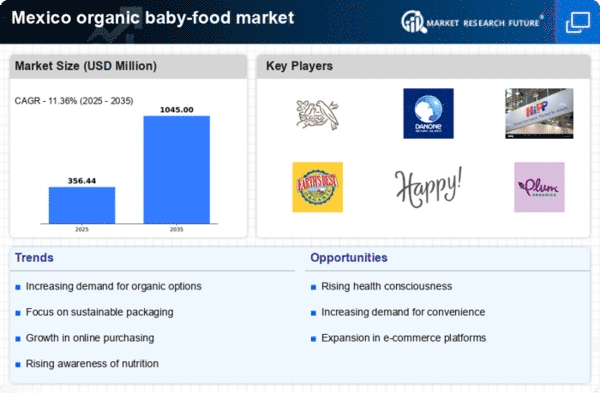Rising Disposable Income
The organic baby-food market in Mexico is likely to benefit from the rising disposable income among families. As economic conditions improve, more households are willing to allocate a larger portion of their budget towards premium food products, including organic baby food. This trend is evidenced by a 15% increase in spending on organic products in the last year. Families are increasingly viewing organic baby food as an investment in their children's health, which may lead to a sustained demand for these products. The organic baby-food market is thus poised for growth, as higher disposable incomes enable parents to prioritize quality over cost when selecting food for their infants.
Health Consciousness Among Parents
The organic baby-food market in Mexico experiences a notable surge in demand driven by the increasing health consciousness among parents. As more families prioritize nutrition, they seek products that are free from artificial additives and preservatives. This trend is reflected in a 30% growth in organic baby-food sales over the past year, indicating a shift towards healthier dietary choices for infants. Parents are increasingly aware of the long-term health benefits associated with organic foods, which may lead to a sustained increase in market demand. The organic baby-food market is thus positioned to benefit from this heightened awareness, as parents are willing to invest more in premium products that promise better health outcomes for their children.
Growing Awareness of Environmental Impact
The organic baby-food market in Mexico is significantly influenced by the growing awareness of environmental issues among consumers. Parents are increasingly concerned about the ecological footprint of their food choices, leading to a preference for organic products that are perceived as more sustainable. This shift is reflected in a 40% increase in consumer interest in eco-friendly packaging and sourcing practices over the past year. The organic baby-food market is likely to benefit from this trend, as brands that prioritize sustainability may attract a loyal customer base. As environmental awareness continues to rise, the demand for organic baby food is expected to grow, potentially reshaping the market landscape in the coming years.
Government Support for Organic Agriculture
In Mexico, government initiatives aimed at promoting organic agriculture significantly bolster the organic baby-food market. Policies that support organic farming practices not only enhance the availability of organic ingredients but also encourage local farmers to transition to organic methods. This support is crucial, as it aligns with the growing consumer preference for locally sourced, organic products. The organic baby-food market stands to gain from these initiatives, as they help reduce production costs and improve supply chain efficiency. Furthermore, the government's commitment to sustainability may lead to increased funding for organic farming, potentially resulting in a 20% increase in organic ingredient availability over the next few years.
Influence of Social Media and Online Platforms
The organic baby-food market in Mexico is experiencing a transformation due to the influence of social media and online platforms. Parents are increasingly turning to digital channels for information and recommendations regarding baby food options. This trend has led to a rise in online sales, with a reported 25% increase in e-commerce transactions for organic baby food in the past year. Social media influencers and parenting blogs play a pivotal role in shaping consumer perceptions and preferences, driving demand for organic products. The organic baby-food market is thus adapting to this digital shift, as brands leverage online marketing strategies to reach a broader audience and engage with health-conscious parents.






















Leave a Comment